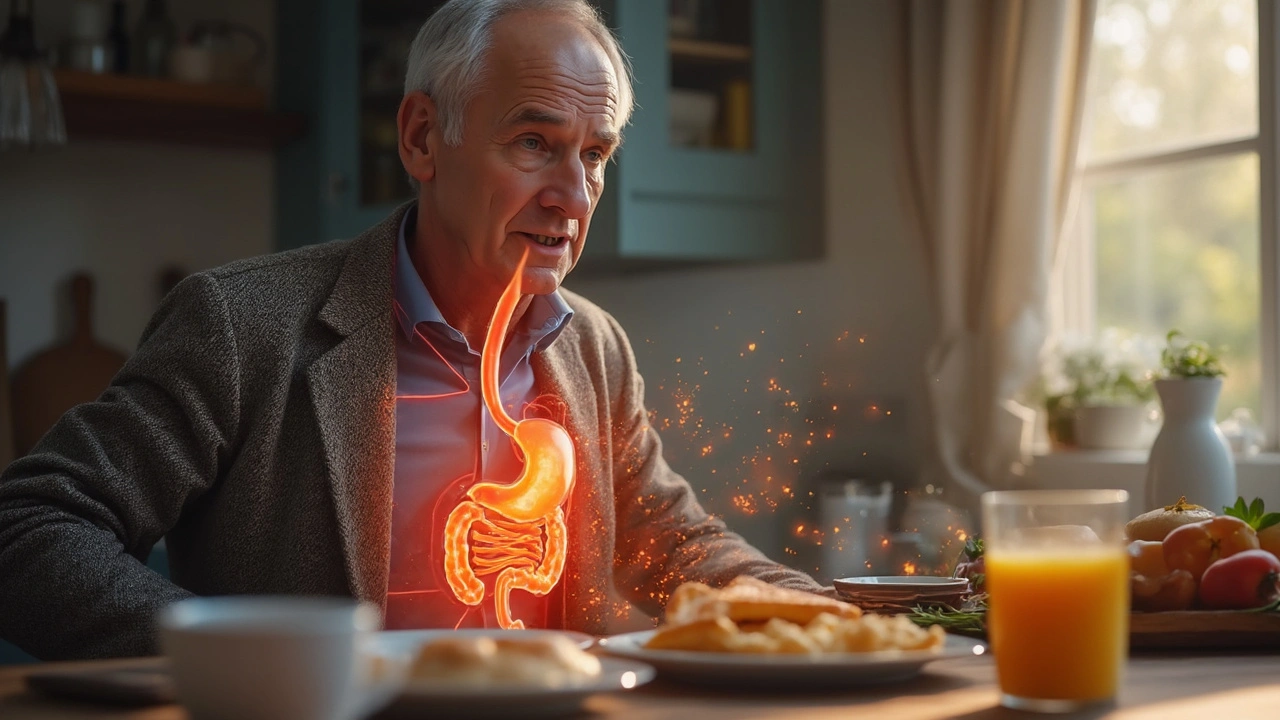Acid reflux: what it feels like and how to fix it fast
If you get a burning chest or throat after eating, that’s acid reflux — stomach acid sneaking up into your esophagus. For many people it’s occasional heartburn; for others it’s a recurring problem called GERD. You don’t need medical jargon right now — you need clear steps that help today and prevent the next flare.
Simple steps for fast relief
Try these first-line moves that often stop heartburn quickly: sit upright, sip room-temperature water, chew a piece of gum (it boosts saliva and clears acid), or take an antacid like calcium carbonate for immediate neutralization. Avoid lying down for at least 2–3 hours after meals. If you sleep with reflux, raise the head of your bed 6–8 inches or use a wedge pillow to keep acid from traveling upward.
Over-the-counter options: antacids (Tums, Maalox) give quick, short relief. H2 blockers (famotidine) reduce acid for several hours. Proton pump inhibitors (omeprazole, esomeprazole) cut acid production more strongly but take a few days to reach full effect. If you need a PPI regularly, talk to your doctor before long-term use.
Watch what you eat. Common triggers include coffee, alcohol, chocolate, peppermint, spicy food, fried or fatty meals, citrus, tomatoes and large portions. Try smaller meals, avoid trigger foods, and don’t eat within a couple of hours of bedtime. Losing extra weight and quitting smoking also reduce reflux for many people.
When acid reflux needs a doctor's visit
See a doctor if heartburn happens more than twice a week, or if symptoms persist despite OTC meds and lifestyle changes. Also get immediate care for severe chest pain, difficulty swallowing, unexplained weight loss, vomiting blood, or black stools — these can signal complications or other serious conditions.
Chronic reflux can damage the esophagus, cause persistent cough or hoarseness, and in some people lead to Barrett’s esophagus, which needs medical monitoring. Your doctor may suggest testing (like endoscopy) or prescribe stronger treatments, and will rule out other causes of chest pain.
Want a quick plan to try this week? 1) Cut out coffee and alcohol for 7 days, 2) eat five small meals instead of three big ones, 3) don’t lie down for three hours after eating, 4) try an antacid for immediate relief and a short PPI if symptoms are frequent. If that doesn’t help, book a medical check-up.
On this site you’ll find deeper guides on medications, diet strategies, and when to consider testing. Use these tips now, and reach out to a healthcare pro if reflux keeps interfering with your life.

Protonix: The Truth About This Acid Reducer, How It Works, and Real-Life Tips
Protonix, known generically as pantoprazole, is a widely prescribed medicine for controlling stomach acid. This article lays out what Protonix does inside your body, who actually needs it, and what you need to watch out for if you take it. There are some very interesting facts about long-term use, and you'll read actionable tips to make it work its best for you. If you want the real story behind heartburn and acid blockers, this is for you.
read more




